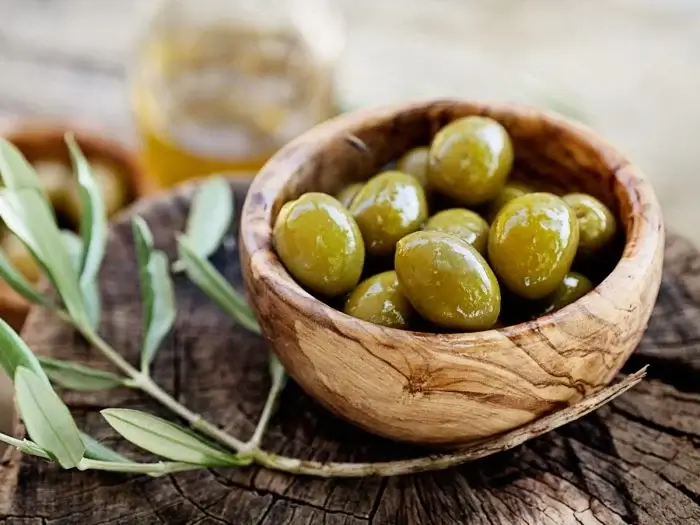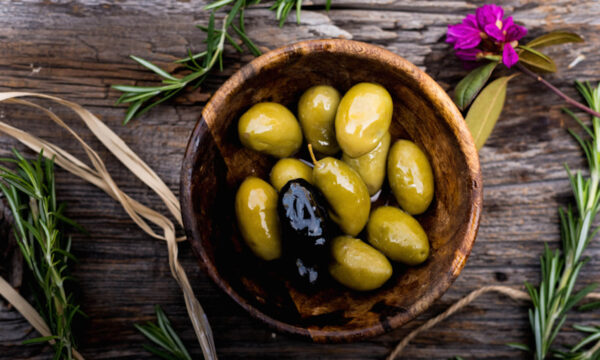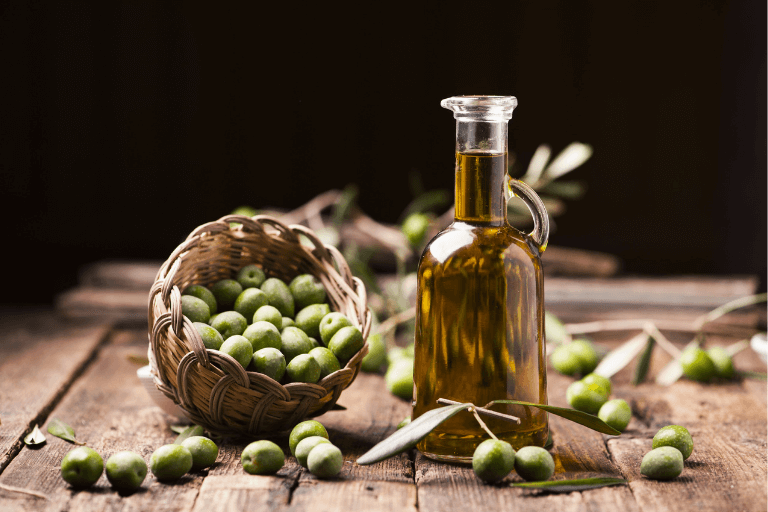wellhealthorganic.com:11-health-benefits-and-side-effects-of-olives-benefits-of-olives: Olives, the small fruit with a rich history, offer remarkable health benefits. Packed with monounsaturated fats, they promote heart health and reduce cholesterol levels. Their antioxidants combat inflammation and protect against chronic diseases like cancer. Olives also provide essential nutrients such as vitamin E, iron, and fiber, supporting overall well-being. However, excessive consumption can lead to weight gain due to their high calorie content. Additionally, olives contain sodium, so those with hypertension should moderate their intake. Despite these considerations, incorporating olives into a balanced diet can contribute to a healthier lifestyle and bring forth nature’s bountiful advantages.
Also Read: wellhealthorganic.com/know-the-causes-of-white-hair-and-easy-ways-to-prevent-it-naturally

What Are The Benefits Of Olives?
1. Olives Help Fight Cancer
Olives are very popular in the Mediterranean region, a staple of the Mediterranean diet, and this may explain the low cancer rates there. The phenolic compounds in olives are most effective in treating and preventing certain forms of cancer. Olives also contain squalene and terpenoids, other compounds with anti-cancer properties.
Also Read: wellhealthorganic.com/know-the-causes-of-white-hair-and-easy-ways-to-prevent-it-naturally
2. Boost Heart Health
The oxidative stress we’re talking about can also damage your heart. An excess of this stress oxidizes cholesterol, causing heart attacks. But thanks to the antioxidants in olives, this can be prevented as it reduces stress by lowering cholesterol levels.
Olives also contain fat, but that’s the right kind of fat. The oleic acid (a monounsaturated fatty acid) in olives reduces inflammation and reduces the risk of heart disease.
Another important nutrient in olives is copper, a deficiency of which has been linked to heart disease. Americans are not consuming enough copper, which could be another reason for the rise in heart disease.
3. Fight Inflammation
The monounsaturated fats in olives, along with vitamin E and polyphenols, help fight inflammation and related diseases and strengthen the immune system. They also contain another important compound called oleocanthal, which has very good anti-inflammatory properties. This is another reason why olives are also good at reducing pain in the body (although we recommend talking to your doctor before using olives for this purpose).
Oleocanthal works by blocking the production of COX-1 and COX-2, enzymes known to cause inflammation (fun fact: that’s how Tylenol works). More interestingly, this property of olives is similar to that of ibuprofen, a popular anti-inflammatory drug.
Also Read: wellhealthorganic.com/know-the-causes-of-white-hair-and-easy-ways-to-prevent-it-naturally

4. Prevent Osteoporosis
Studies show how olives and their polyphenols can help prevent bone loss in the elderly. Polyphenols work by increasing the number of osteoblasts (cells that secrete the substrate for bone formation), which promotes healthy bones.
Hydroxytyrosol, the antioxidant in olives we’ve already mentioned, also helps prevent osteoporosis. It also plays a role in bone formation and maintenance, serving as an effective remedy for osteoporosis symptoms.
Also Read: wellhealthorganic.com/know-the-causes-of-white-hair-and-easy-ways-to-prevent-it-naturally
5. Improve Digestive Health
Olives have biological potential, which makes them all the more important for maintaining digestive health. Olives are a fermented food, which means they are rich in the gut-friendly bacteria lactobacillus.
The phenolic compounds in olives can also prevent the growth of H. pylori, a bacteria that causes gastritis. The phenols in olives tend to stay in the stomach for a long time, often acting as gut bacteria and improving digestive health.

6. Can Aid Weight Loss
As noted, olives are high in monounsaturated fatty acids, which may reduce the risk of obesity. These fatty acids also increase levels of good cholesterol, which means your body performs its activities more efficiently, including burning calories.
Olives also stimulate blood circulation, increasing the effectiveness of your workouts. This ultimately leads to maintaining a healthy weight. And thanks to their digestive benefits, olives ensure optimal absorption of nutrients from the foods you eat, leaving only a few calories to be stored as fat.
Interestingly, fat from olives can cause satiety and may lead to reduced food intake. You can even snack on olives instead of crackers before a meal.
Also Read: wellhealthorganic.com/know-the-causes-of-white-hair-and-easy-ways-to-prevent-it-naturally
7. Olives Enhance Brain Health
The brain is mainly made up of fatty acids, so we now know how olives contribute to it. The monounsaturated fatty acids in olives help maintain memory and even improve concentration. Eating olives has also been shown to prevent brain cell death (caused by disease) and reduce memory loss.
And haven’t we talked about oleuropein, an important antioxidant in olives? Research shows how this compound reduces oxidative damage in the substantia nigra, an area of the brain most affected by diseases like Parkinson’s disease.
8. May Lower Blood Sugar Levels
Although little is known about it, some sources suggest that olives can help lower blood sugar and control diabetes. Olives can change the way the body makes and responds to insulin, which can help patients with high blood sugar.
Also Read: wellhealthorganic.com/know-the-causes-of-white-hair-and-easy-ways-to-prevent-it-naturally
9. Olives Can Improve Vision
Research is ongoing, but the antioxidants in olives certainly prove a point in maintaining eye health. Oxidative stress can also affect your vision and the antioxidants in olives can prevent this from happening.
10. Boost Skin And Hair Health
The fatty acids and antioxidants in olives nourish and moisturize both skin and hair. Vitamin E is the most powerful antioxidant in olives, which helps protect the skin from UV rays and even helps prevent wrinkles and maintain skin health.
The oleic acid in olives further improves the appearance of the skin and improves the health of the hair. Here are some ways olives can benefit you. But besides the antioxidants we’ve already seen, other important nutrients also contribute to their well-being. Who are they?
Also Read: wellhealthorganic.com/know-the-causes-of-white-hair-and-easy-ways-to-prevent-it-naturally
What Are The Side Effects Of Taking Too Many Olives?
1. Issues During Pregnancy And Breastfeeding
There is not enough information about it. Therefore, pregnant and lactating women should eat olives (or olive oil) in normal amounts and avoid too much.
2. Might Lower Blood Sugar Way Too Much
Olives can significantly lower blood sugar in people who are taking blood sugar-lowering medications. Therefore, consult your doctor before taking olives.
3. High Sodium
Olives can contain large amounts of sodium. So storing them might not be a good idea. Consume them within limits. Eating 5-6 olives a day would be a smart goal. If you have blood pressure problems, avoid eating olives and consult your doctor.
Also Read: wellhealthorganic.com/know-the-causes-of-white-hair-and-easy-ways-to-prevent-it-naturally
4. Drug Interactions
Olives may interfere with blood sugar and blood pressure medications. If you are taking these medications, please consult your doctor before eating olives.




